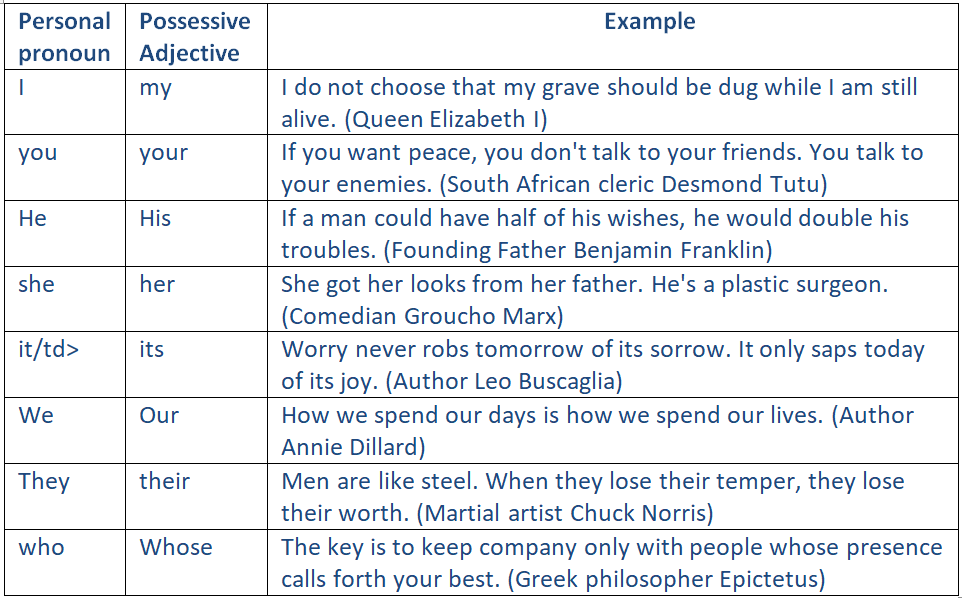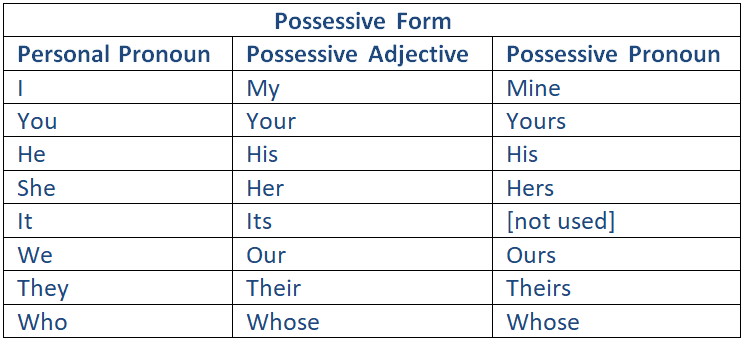

Grammar


Tenses


Present

Present Simple

Present Continuous

Present Perfect

Present Perfect Continuous


Past

Past Simple

Past Continuous

Past Perfect

Past Perfect Continuous


Future

Future Simple

Future Continuous

Future Perfect

Future Perfect Continuous


Parts Of Speech


Nouns

Countable and uncountable nouns

Verbal nouns

Singular and Plural nouns

Proper nouns

Nouns gender

Nouns definition

Concrete nouns

Abstract nouns

Common nouns

Collective nouns

Definition Of Nouns

Animate and Inanimate nouns

Nouns


Verbs

Stative and dynamic verbs

Finite and nonfinite verbs

To be verbs

Transitive and intransitive verbs

Auxiliary verbs

Modal verbs

Regular and irregular verbs

Action verbs

Verbs


Adverbs

Relative adverbs

Interrogative adverbs

Adverbs of time

Adverbs of place

Adverbs of reason

Adverbs of quantity

Adverbs of manner

Adverbs of frequency

Adverbs of affirmation

Adverbs


Adjectives

Quantitative adjective

Proper adjective

Possessive adjective

Numeral adjective

Interrogative adjective

Distributive adjective

Descriptive adjective

Demonstrative adjective


Pronouns

Subject pronoun

Relative pronoun

Reflexive pronoun

Reciprocal pronoun

Possessive pronoun

Personal pronoun

Interrogative pronoun

Indefinite pronoun

Emphatic pronoun

Distributive pronoun

Demonstrative pronoun

Pronouns


Pre Position


Preposition by function

Time preposition

Reason preposition

Possession preposition

Place preposition

Phrases preposition

Origin preposition

Measure preposition

Direction preposition

Contrast preposition

Agent preposition


Preposition by construction

Simple preposition

Phrase preposition

Double preposition

Compound preposition

prepositions


Conjunctions

Subordinating conjunction

Correlative conjunction

Coordinating conjunction

Conjunctive adverbs

conjunctions


Interjections

Express calling interjection

Phrases

Sentences


Grammar Rules

Passive and Active

Preference

Requests and offers

wishes

Be used to

Some and any

Could have done

Describing people

Giving advices

Possession

Comparative and superlative

Giving Reason

Making Suggestions

Apologizing

Forming questions

Since and for

Directions

Obligation

Adverbials

invitation

Articles

Imaginary condition

Zero conditional

First conditional

Second conditional

Third conditional

Reported speech

Demonstratives

Determiners


Linguistics

Phonetics

Phonology

Linguistics fields

Syntax

Morphology

Semantics

pragmatics

History

Writing

Grammar

Phonetics and Phonology

Semiotics


Reading Comprehension

Elementary

Intermediate

Advanced


Teaching Methods

Teaching Strategies

Assessment
Possessive Adjective
المؤلف:
GRAMMER MONSTER.COM
المصدر:
...
الجزء والصفحة:
...
16-5-2021
1211
Possessive Adjectives
The possessive adjectives are my, your, his, her, its, our, their, and whose. A possessive adjective sits before a noun (or a pronoun) to show who or what owns it.
NB: Since the 1960s, possessive adjectives are increasingly called "possessive determiners." Both terms are still in common use. "Possessive adjective" is currently about twice as popular as "possessive determiner."
Easy Examples of Possessive Adjectives
In the examples below, the possessive adjectives are shaded.
She likes your hat.
(The possessive adjective "your" sits before the noun "hat" to tell us who owns it.)
I think her dog has eaten my gerbil.
(The possessive adjectives "her" and "my" are sitting before (or modifying as it's called) the nouns "dog" and "gerbil" to tell us who owns them.)
Real-Life Examples of Possessive Adjectives
In the examples below, the possessive adjectives are shaded and the nouns being modified are bold. The table also shows how each possessive adjective corresponds to a personal pronoun.

More about Possessive Adjectives
Possessive adjectives are classified as a type of pronoun. Look at this example:
Is that the Queen's hat?
No, it's her crown.(In this example, the possessive adjective "her" replaces the noun "the Queen.")
This example proves that possessive adjectives function like pronouns. (Grammarians say they have "a pronominal function.") As normal adjectives (e.g., big, yellow, funny) don't replace nouns, some grammarians don't classify possessive adjectives as adjectives at all but as determiners.
You may find it helpful to group possessive adjectives and possessive pronouns (e.g., mine, yours, hers) under the term possessive form. This helps to differentiate between possessive adjectives (e.g., my, your) and possessive pronouns (e.g., mine, yours).
Here is a list of personal pronouns with their corresponding possessive adjectives and possessive pronouns, i.e., their possessive forms.

Why Should I Care about Possessive Adjectives?
Grammar mistakes with possessive adjectives are rare. However, spelling mistakes with possessive adjectives are common. Given how common the possessive adjectives are, misspelling them (particularly if you make a habit of it) will smash your credibility.
There are four common spelling mistakes with possessive adjectives. (Don't worry. Fixing all four is easy because they're all made the same way – by confusing the possessive adjective with an identical-sounding contraction.)
(Common Mistake 1) Don't write "it's" when you mean "its" (or vice versa)
The contraction "it's" has nothing to do with possession, i.e., it is not a possessive adjective. "It's" is short for "it is" or "it has." This is a 100% rule. If you can't expand your "it's" to "it is" or "it has," then it's wrong.
A country can be judged by the quality of it's proverbs. (incorrect)
To some extent, this mistake is understandable because apostrophes are used for possession (e.g., the dog's nose). But, "it's" has nothing to do with possession. No, really, it doesn't.
(Common Mistake 2) Don't write "you're" when you mean "your" (or vice versa).
"You're" is short for "you are." This is a 100% rule. If you can't expand your "you're" to "you are," then it's wrong.
Even if you fall on you're face, you're still moving forward. (incorrect)
(The first "you're" is wrong. The second is correct.)
(Common Mistake 3) Don't confuse "there," "they're", and "their."
"They're" is short for "they are." This is a 100% rule. If you can't expand your "they're" to "there are," then it's wrong. "There (just like the word "here") is a place. It's also used in expressions like "There are dragons" or "There's an issue."
Forgive your enemies, but never forget there names. (incorrect)
(Common Mistake 4) Don't write "who's" when you mean "whose" (or vice versa).
"Who's" is short for "who is" or "who has." This is a 100% rule. If you can't expand your "who's to "who is" or "who has," then it's wrong.
Never go to a doctor who's office plants have died. (incorrect)
(A More Technical Issue) Don't use "his/her."
There's an issue with possessive adjectives in English. We don't have a singular non-gender-specific one that can be used with people. We have "its," but you can't use "its" with people.
Each owner is responsible for its dog. (incorrect)
("Its" can't be used with people.)
So, when your singular person could be male or female, you have two options: (1) use "their" or (2) use "his/her."
Each owner is responsible for their dog. (correct)
(Using "their" to replace a singular noun (here, "owner") is acceptable. This is the best option.)
Each owner is responsible for his/her dog. (incorrect)
(This is acceptable to some, but it's clumsy.)
There used to be a third option: use "his" with a caveat.
Each owner is responsible for his dog. (incorrect)
(This is acceptable if all owners are male. If they're not, avoid this option, even with a caveat explaining that "his" means "his/her.")
 الاكثر قراءة في Possessive adjective
الاكثر قراءة في Possessive adjective
 اخر الاخبار
اخر الاخبار
اخبار العتبة العباسية المقدسة

الآخبار الصحية















 قسم الشؤون الفكرية يصدر كتاباً يوثق تاريخ السدانة في العتبة العباسية المقدسة
قسم الشؤون الفكرية يصدر كتاباً يوثق تاريخ السدانة في العتبة العباسية المقدسة "المهمة".. إصدار قصصي يوثّق القصص الفائزة في مسابقة فتوى الدفاع المقدسة للقصة القصيرة
"المهمة".. إصدار قصصي يوثّق القصص الفائزة في مسابقة فتوى الدفاع المقدسة للقصة القصيرة (نوافذ).. إصدار أدبي يوثق القصص الفائزة في مسابقة الإمام العسكري (عليه السلام)
(نوافذ).. إصدار أدبي يوثق القصص الفائزة في مسابقة الإمام العسكري (عليه السلام)


















